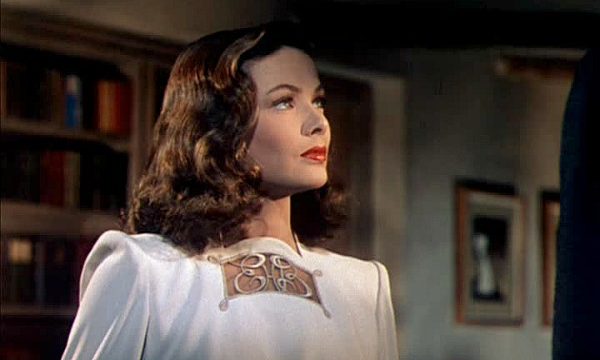Only once did Gene Tierney work in the Hollywood Canteen. It was June 1943, and she was pregnant. While there, she was exposed to and later contracted German measles—rubella.Which causes birth defects. Tierney’s daughter, Daria, was born extremely premature and dangerously underweight—barely over three pounds. Daria was partly blind, fully deaf, severely mentally disabled. And some years later, a fan came up to Tierney, gushing to her about how much she loved her. So much she’d been under quarantine for German measles but had sneaked out to see her at the Hollywood Canteen. Agatha Christie would later write a mystery novel about the expected outcome of such a revelation.
It’s hardly the only tragedy in Tierney’s life, but it’s also impossible to say how much her later battles with depression came from dealing with that. (In one unalloyed act of good that I know about from him, Howard Hughes paid Daria’s medical expenses.) It could also have been from any number of other causes, including overwork and a family history, not that I know if there’s a family history. She was an honest-to-Gods socialite who made a society debut and everything. She believed Kennedy would marry her, but he told her he couldn’t—several sources claim because of his political ambition but also, it seems to me, because he was a Catholic and she had already been divorced. And, of course, she started smoking heavily in order to deepen her voice, then died of emphysema.
Oh, but she was a woman of beauty and talent for all that. Many of her movies weren’t very good, but there are several that, if they were the only movie we had from her, she’d still be worth remembering. Laura. The Ghost and Mrs. Muir. Her breathlessly chilling—and Oscar-nominated—performance in Leave Her to Heaven. She lost to Joan Crawford for Mildred Pierce, and honestly, I think Tierney was better. Her exquisite madness was so much more intriguing than Crawford’s long-suffering martyrdom, even if Crawford had a lot of practice in the role.
She was probably one of the biggest stars of noir, at least of the stars to routinely appear in it. There was something shadowy to her allure, even when she was playing the wholesome and proper Mrs. Muir. After all, we’re talking about a woman who was basically having a love affair with a ghost—and the ghost of a sea captain, yet, who probably had any number of stories more ribald than the ones he told her. She played con artists and bandits and outright murderers with the same grace and beauty that she brought to Mrs. Muir, and why wouldn’t you cast that if you could? How better to subvert expectations?
Her battle with mental illness seems to have been one of the things that kept her from being a bigger star, and that’s a shame. Not just because it’s always a shame when mental illness keeps people from leading the full and expressive lives that they could. I could write a book about that, if my mental health issues let me work consistently enough to write a book about something these days. However, it’s also a shame because we are robbed of what doubtless would have been more great performances. She was luminous. Depression worked to dim her.

